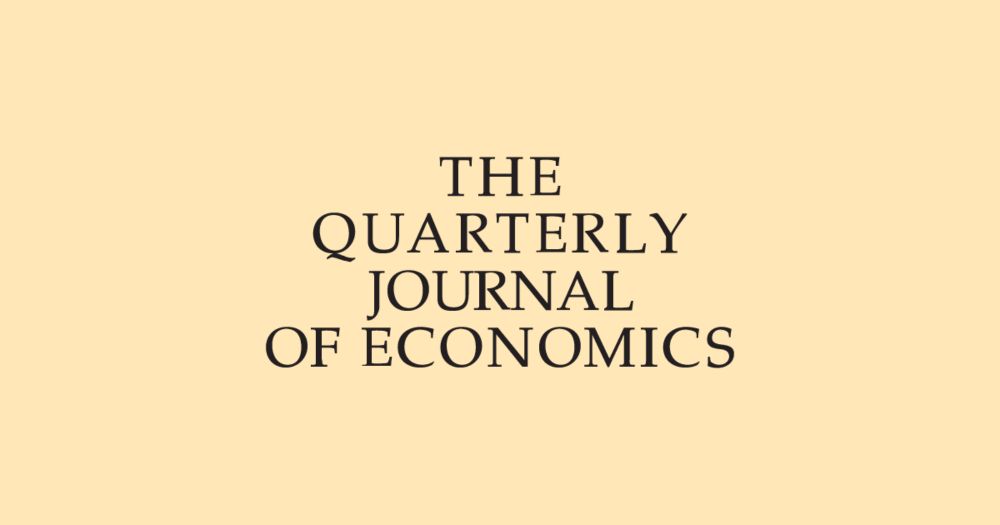
Researching pupils, teachers and schools. Professor of Economics, University of Bristol. FBA. Views my own.
Reposted by Simon Burgess

We've now published our first three reports on curriculum, accountability and SEND.
www.ces.partners/copy-of-latest
Reposted by Simon Burgess, Will Jennings, Steve Peers
The price of aid cuts.
I always say to people that the ideal @theifs.bsky.social work is rigorous enough to publish in top journals, and relevant enough to be on the front page. I think we've ticked that box here!
🏆 Find out more: ifs.org.uk/news/ifs-sur...
Reposted by Simon Burgess, Luke Sibieta, Peter Levell
🏆 Find out more: ifs.org.uk/news/ifs-sur...

I always say to people that the ideal @theifs.bsky.social work is rigorous enough to publish in top journals, and relevant enough to be on the front page. I think we've ticked that box here!
Reposted by Simon Burgess

www.lse.ac.uk/school-of-pu...
Reposted by Simon Burgess, Joshua Goodman, Raquel Fonseca

"We estimate large positive marginal effects of local educational spending on Black students’ enrollment, attainment, and lifetime earnings."
Reposted by Anne Applebaum, Timothy Snyder, Dorothy Bishop , and 19 more Anne Applebaum, Timothy Snyder, Dorothy Bishop, Simon Burgess, Mel Bartley, Gavin A. Schmidt, Christopher Wright, Michael A. Clemens, Maarten Vink, Leigh Sparks, Charles West, Robert C. Richards, Aaron Sojourner, Stephen D. Murphy, Marina Costa Lobo, Jonathan Birch, Ann Bartow, Georg Weizsäcker, Nathan Richardson, Christina Pagel, William G. Wade, Pam Jarvis

Reposted by Simon Burgess

The proposed new method of calculating Attainment 8 will not affect schools' Progress 8 scores greatly but will shift the incentives to enter particular subjects.
vist.ly/4esnb
Reposted by Simon Burgess, Tim Morris

Reposted by Simon Burgess

Pupils from affluent households are more likely to gain a place at a top 2ry school.
✍️ @profsimonb.bsky.social @estellecantillon.bsky.social @mariagraziacavallo.bsky.social & E. Greaves.
ℹ️ www.bristol.ac.uk/news/2025/no...
Reposted by Simon Burgess, Steven N. Durlauf


"by 2025, Brexit had reduced UK GDP by 6% to 8%, with the impact accumulating gradually over time." 😲
Hope you treat it like a sports trophy and raise it above your head shouting your team.
Reposted by Simon Burgess
marketdesigner.blogspot.com/2025/11/scho...
#econsky
Reposted by Simon Burgess, Peter Holmes
By Ellen Greaves, @estellecantillon.bsky.social, @mariagraziacavallo.bsky.social and me.
Blog economics.blogs.bristol.ac.uk/2025/11/06/a...
Policy briefing
www.bristol.ac.uk/media-librar...
#EconSky #EduSky
1/9
@woessman.bsky.social
@annavignoles.bsky.social
@hhsievertsen.bsky.social
@samfr.bsky.social
@timleunig.bsky.social
@nuffieldfoundation.org
@lindseymacmillan.bsky.social
9/9
www.bristol.ac.uk/media-librar...
Many thanks for funding to Nuffield Foundation www.nuffieldfoundation.org
Hosted by Uni of Bristol Economics.
7/9
Just one: family background definitely more important than school;
BUT narrowing differences in family background is very hard for policy, so that route near-impossible. This policy reform is feasible and cheap and works.
6/9
5/9
Under the reform, almost all FSM-eligible pupils get their first choice.
Very targeted: 94% of all pupils are assigned to the same school as baseline
4/9
priority in school admissions for pupils eligible for Free School Meals (FSM), up to 15% of seats per school.
We also modelled two other reforms but the FSM Quota reform was best: very effective and very targeted.
3/9
While effective schools are often nearby, their catchments do not cover these neighbourhoods, reducing choice and later attainment.
2/9
By Ellen Greaves, @estellecantillon.bsky.social, @mariagraziacavallo.bsky.social and me.
Blog economics.blogs.bristol.ac.uk/2025/11/06/a...
Policy briefing
www.bristol.ac.uk/media-librar...
#EconSky #EduSky
1/9
Reposted by Simon Burgess, Jack Stilgoe





It analyzes 630,000 paintings (1400-2000) to extract emotions and shows how art tracks living standards, wars, inequality, and even climate shocks.
(How is this economics? Everything is economics!)

